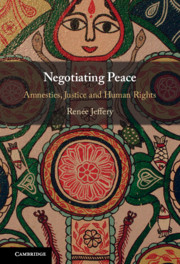Introduction
Published online by Cambridge University Press: 04 March 2021
Summary
In 1999 the United Nations performed a significant about-face in its policy concerning the use of amnesties in peace negotiations. Where once it had condoned and even supported the use of amnesties, including those that immunise perpetrators of human rights violations against prosecutions and punishment, the UN Secretary-General, Kofi Annan, now issued a statement prohibiting UN peace negotiators from offering amnesties for human rights violations, even when the signing of a peace agreement was at stake. This chapter introduces the United Nations’ anti-amnesty policy, provides an overview of its theoretical underpinnings, development, establishment as a policy norm, and considers its implications for peace negotiators.
- Type
- Chapter
- Information
- Negotiating PeaceAmnesties, Justice and Human Rights, pp. 1 - 34Publisher: Cambridge University PressPrint publication year: 2021



